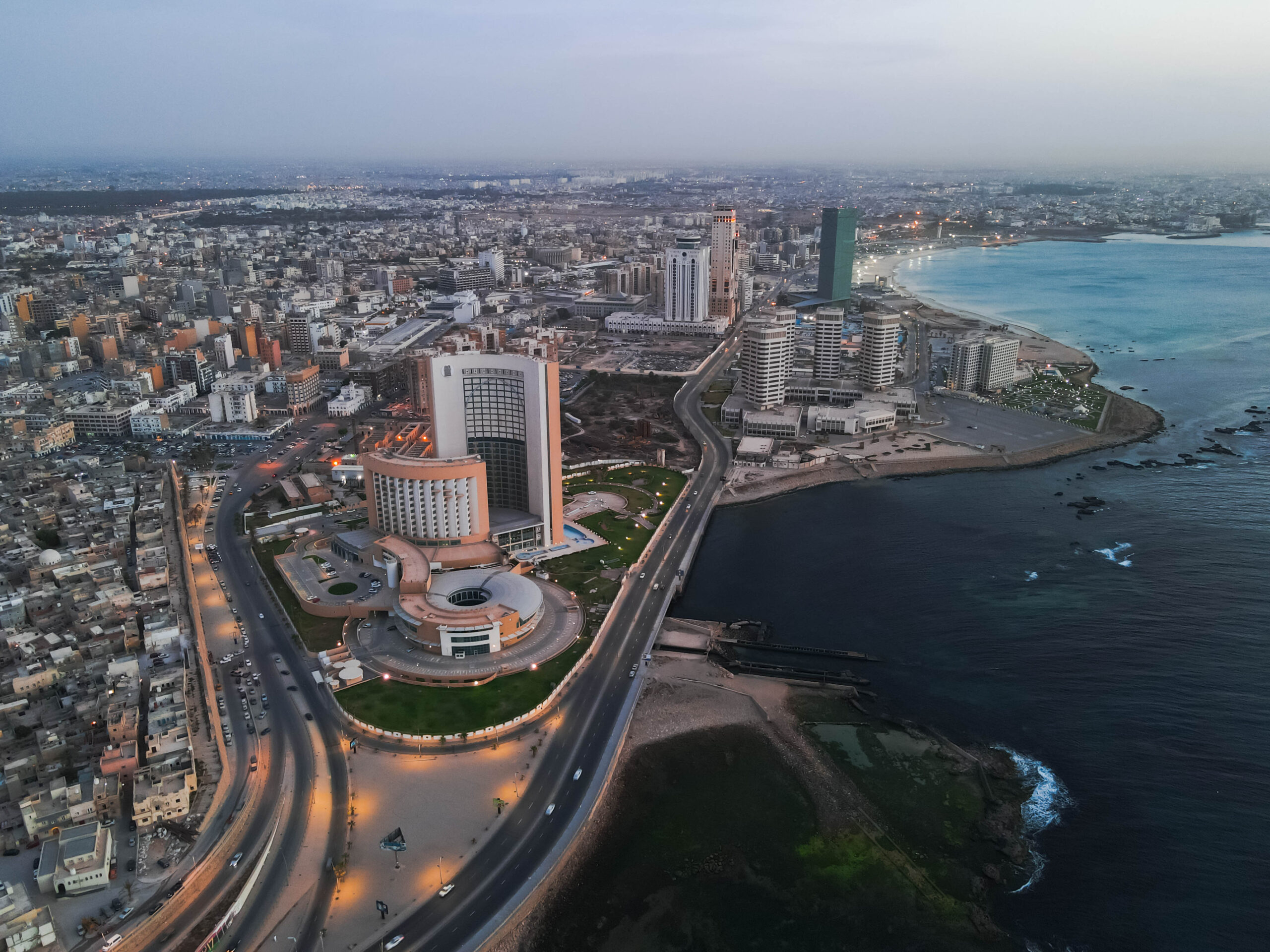Libya is undergoing significant transformation after years of conflict. Tensions are easing among the various factions, and the country’s economic potential, driven by abundant oil and gas resources, is now opening up to new sectors of investment. Through an ambitious and proactive policy, Libya is seeking to attract foreign capital and boost its business environment by encouraging active participation in its economy.
Political and economic context: emerging stability
The ceasefire, signed in 2020 under UN auspices, ended the fighting between different factions and brought stability, despite occasional blockages in oil field operations. While an agreement on an election process has yet to be reached, the two Libyan factions managed to agree on September 26, also under UN auspices, on appointing Mr. Naji Issa as the new Governor of the Central Bank. This critical appointment has eased the deadlock caused by a power struggle lasting over a month, but more importantly, it is the tangible manifestation of a modus vivendi established following an agreement on the sharing of oil revenues.
Thus, after years of turmoil and conflicts among the ruling factions, they have realized that stabilizing the economic situation, if not achieving political reconciliation, is to everyone’s benefit.
Sector opportunities: a diversifying economy
Libya’s development traditionally relies on its strategic geographical location and the abundance of its oil and gas resources. This calm has reminded foreign operators of the country’s many opportunities and the potential benefits of establishing investment positions already.
Investment opportunities span a wide range of sectors, including oil and gas, infrastructure, agriculture, tourism, and the food industry. Libya had already undertaken significant reforms to make the business environment more attractive to foreign companies.
Libya’s economy is largely driven by the oil and gas sector, which remains the primary engine of growth for the nation. In 2023, Libya experienced a 10% increase in GDP, primarily attributed to the recovery of oil production after significant disruptions in 2022 due to political instability and conflict. This rebound highlights the sector’s critical importance to the overall economic framework and highlights Libya’s potential to regain its status as a leading energy supplier in the region.
Looking ahead, Libya has set ambitious targets to significantly boost oil output by 2025. The government is investing in infrastructure improvements and modernizing existing facilities to maximize production capabilities. This proactive approach not only aims to solidify Libya’s role as a major energy player but also seeks to attract international partnerships and investments.
In addition to its focus on oil, the Libyan government is actively pursuing economic diversification to reduce its reliance on oil revenues This initiative includes exploring promising sectors such as agriculture, which has the potential to enhance food security and create jobs; renewable energy, which could position Libya as a leader in sustainable energy within the region; and tourism, where efforts are being made to promote the country’s rich cultural heritage and natural beauty.
To support these diversification efforts, initiatives like the establishment of Special Economic Zones (SEZs) are being introduced. These zones are designed to create a more favorable investment climate by offering incentives such as tax breaks, streamlined regulations, and improved infrastructure. By attracting foreign investors to these SEZs, Libya aims to foster sustainable economic development, stimulate job creation, and enhance overall economic resilience. Through these combined efforts, Libya is not only looking to stabilize its economy but also to build a more diverse and robust economic future.
Legal frameworks for foreign companies
Today, foreign companies wishing to establish themselves in Libya can choose among the following different legal forms: joint venture, branch, representative office, or as an investment project under the Privatization and Investment board (P.I.B).
- Joint Venture (Mushtaraka): the Mushtaraka allows a foreign company to partner with a Libyan company, whether private or public. This model requires a partnership between foreign investors and Libyan shareholders, guaranteeing a minimum of 51% local ownership. However, the Minister of Economy can grant exceptions, allowing foreign investors to hold up to 60%. Generally, the registration of joint ventures permits participation in various commercial activities and economic sectors, provided they align with the primary activities of the foreign investors. The minimum capital is 1 million LYD, or approximately €190,000.
- Branches: foreign companies can also open branches, but only for activities specified in a list set by decree. These sectors include construction and public works, electricity, oil and gas, environmental protection, telecommunications, studies and planning, IT, industry, consultancy, technical studies, and training. A Libyan national must be appointed as either the branch manager or deputy branch manager. Foreign companies wishing to open a branch must be joint-stock companies recognized in their chosen field or activity. An initial license is granted for a maximum of five years, which can be renewed after expiry. A minimum of 250,000LYD must be transferred as the branch incorporation capital.
- Representative office: foreign companies not wishing to adopt the aforementioned models have the option of establishing a representative office. This model offers some flexibility and serves as a liaison point between the foreign company and its clients. The office enables a better understanding of the local business landscape by identifying commercial trends, investment opportunities, and potential partners. Despite these advantages, the office is subject to significant restrictions. Its operations are strictly limited to non-commercial functions. Establishing an office requires prior specific authorization from the Libyan Minister of Economy and Finance. Office activities are limited to two years, renewable once.
- Investment project under the P.I.B: finally, the subsidiary allows foreign investors to establish companies without Libyan participation. This is permitted in various sectors to support the country’s development. Key sectors include manufacturing, health, tourism, services, agriculture, and real estate. The minimum required capital depends on the degree of foreign ownership. If the subsidiary is 100% foreign-owned, the minimum required capital is 5 million LYD.
To encourage foreign investment, Libya offers several financial and fiscal incentives. Reinvested profits in the project, as well as dividends not transferred abroad, benefit from tax exemptions. Foreign investors can repatriate their capital at the end of the project and recover their initial investments without restriction, thus enhancing the security and confidence of companies considering long-term establishment in Libya.
Tax environment
Corporate profits are taxed at a standard rate of 20%, with an additional 4% tax. Dividends are tax-exempt.
Foreign subsidiaries and branches have two options: they can register locally, complying with Libyan regulations, or appoint a tax representative to register the contract and ensure that taxes are paid on anticipated profits (presumed tax system).
Companies may be subject to other taxes and fees, such as registration and stamp duty (Damgha), commercial lease registration tax, credit opening contract registration tax, VAT, transfer tax, property tax, and dividend tax.
Conclusion
In conclusion, Libya currently offers significant opportunities for foreign investors, providing a wide range of legal and economic models adapted to different sectors and implementing financial and fiscal incentives.
Entering the Libyan market, however, requires an understanding of local law and practices and, notably, the involvement of a law firm. Despite certain administrative challenges and specific restrictions, Libya positions itself as an attractive emerging market, offering numerous expansion opportunities, particularly in developing non-oil sectors such as agriculture, industry, and renewable energy.
By Georges Sioufi, Attorney at Law – SRDB Law Firm in Paris and Mohanad Hussein, Managing Partner – Abdou Law Firm in Tripoli.
Since October 2024, Abdou Law Firm has been SRDB’s partner in Libya.


